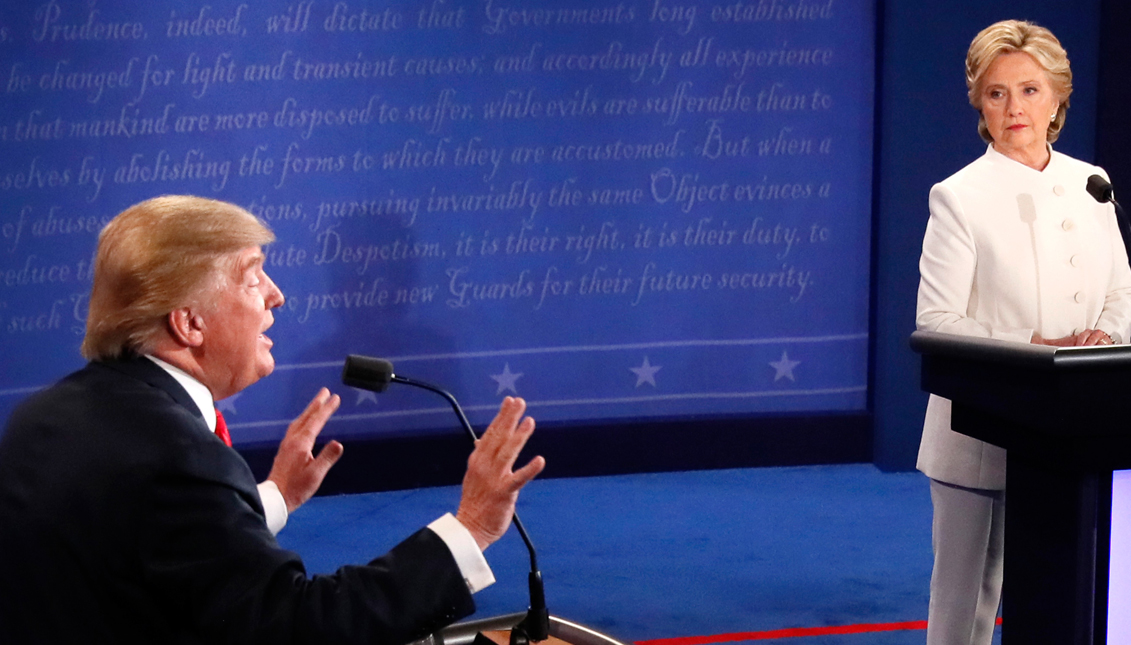
Calls mount to cancel presidential debates
MORE IN THIS SECTION
The 2020 campaign season is completely unprecedented.
It will be the first where two septuagenarians battle for the highest office in the land.
The conventions of both major parties will be mostly virtual and it will be nearly impossible to hold rallies.
More people than ever before will have to vote-by-mail because the ongoing mismanagement of the coronavirus pandemic has made it unsafe for voters to go to the polls.
Yet the president has made it his mission to strike doubt in the alternative system by saying it will lead to fraud without providing substantive data and has gone as far as banning overtime payments for the Postal Service to delay mail deliveries so the public believes his narrative.
On top of it all, there are various political pundits, commentators and writers that are calling for the presidential debates to not be held for this general election and potentially all future ones.
These debates have served as the final tests for party nominees to defend their platforms and prove why they should be the next president.
Americans have consistently tuned into the debates every four years since 1976, when Jimmy Carter took on incumbent Gerald Ford.
Although the first one was in 1960 between John F. Kennedy and Richard Nixon, no debates were scheduled for the next three election years.
Critics are reasonable in saying that the current debate format needs some changes.
Sometimes having live crowds does not help as their reactions to well-timed one-liners or hyperbolic statements may sway viewers at home.
Also, a large part of the crowds are made up by donors and political operatives instead of regular voters.
Debate performances can look very rehearsed and made for cable television.
“In 2016, Donald Trump’s decision to bring three women who had accused former President Bill Clinton of sexual harassment and assault to a debate with Hillary Clinton served to demonstrate that these once stately affairs had, like almost all political pseudo-events, been overtaken by the drive to stage an ever-escalating series of viral stunts,” wrote Alex Sheppard for The New Republic.
These actions get more media coverage than the clashes on policy and make the debate look like a reality show.
Third parties and independents should also have an easier road to the big stage as Democrats and Republicans do not hold a monopoly on good ideas.
In 2016, the two candidates who made it further than anyone predicted were Bernie Sanders and Donald Trump. Both were not seen as party loyalists and too radical to win their party's nomination, proving the American public has an appetite for new voices.
All of this does not mean that we should scrap debates entirely.
With how polarizing the political scene has become in recent years, we cannot simply avoid talking to the other side all together.
Not debating would be an infantile move and lead each major political party to further narrow itself in its own worldview without having to address the concerns of other groups.
The presumptive Democratic nominee, former vice president Joe Biden, plans on having an effortless trail to the White House.
The polls are in his favor, and President Donald Trump is facing immense scrutiny for his handling of the coronavirus and the Tara Reade scandal has long been forgotten.
Biden’s campaign knows that debates are a strong suit for the incumbent and this is why they rejected his call for more debates in June.
The former vice president touts his experience as a reason as to why he should be elected, but must be aware that four year ago the woman who was seen as having the finest resume for the job, Hillary Clinton, was defeated by Trump.
“It's a fool's errand to enter the ring with someone who can't follow the rules or the truth. Biden will undoubtedly take heat from Republicans and the media for skipping the debates. But it's worth the risk as trying to debate someone incapable of telling the truth is an impossible contest to win,” wrote Joe Lockhart for CNN.
Even if Trump lies, Biden should have the wit to call out when it happens.
If he declines to debate he will not only be criticized, but the president will add ammunition to his talking point that Biden is avoiding having his declining cognitive ability displayed to viewers by hiding in his basement and will continue to call him “Sleepy Joe.”
RELATED CONTENT
Skipping the debates did not help Jimmy Carter in 1980. After a tough primary against Senator Ted Kennedy, he did not participate in the first presidential debate because the League of Women Voters invited both Ronald Reagan and independent John Anderson.
Carter’s absence only allowed Reagan to gain popularity and by the time he wanted to participate, it was only a week til the election.
Regan went on to win in a landslide in terms of the electoral college.
The first 2020 presidential debate is scheduled for Sept. 29 and by that time over half of U.S. states will have mail-in ballots. This means if Biden wanted to debate Trump after missing the first event, then it might be too late for him.
Both candidates need to defend their stances while having a moderator who can hold them accountable, as it is unfair to cheat voters out of knowing what steps the new administration will take to solve some of the country’s most pressing issues.
Millions across America are waking up to the inequalities in the country’s criminal justice system and they want to hear their next leader acknowledge it and advocate for reforms on stage.
Biden potentially selecting a Black female vice president is not enough. Trump using Biden’s 1994 Crime Bill against him in an attack ad is not enough.
President Trump has softened his rhetoric on immigration after a Supreme Court ruling in June blocked his attempt to terminate DACA.
He has since embraced the president of Mexico, a country he used to say only sent rapists and criminals to the U.S., and he has mentioned giving DREAMers a pathway to citizenship.
Biden has to be on stage to prove why he will deliver on comprehensive immigration reform and answer why he failed to do so when his party had full control of the federal government in his first two years as vice president.
The crisis in Venezuela has also continued to profess itself in the sphere of U.S. foreign policy, but the response has been mixed to say the least.
The Trump administration began publicly addressing the situation at the start of 2019. The White House expressed support for opposition leader Juan Guaidó, but did not take the possibility of military intervention off the list of solutions.
This was made clearer by making Elliot Abrams, a neoconservative who was a chief architeque of the Iraq War and involved in the Iran-Contra scandal, the U.S. Special Representative for Venezuela.
Now Trump has flaunted the idea of meeting with president Nicolas Maduro while lessening his support of Guiadó.
All of this and more is at stake in 2020 and Biden has to go on stage and show the public why they should vote for him instead of campaigning on the fact that he is not the president.






LEAVE A COMMENT:
Join the discussion! Leave a comment.